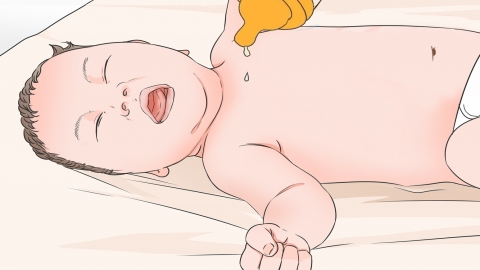What causes mouth ulcers in babies and how to deal with them
Generally, the causes of oral ulcers in infants include nutritional deficiencies, excessive internal heat, mechanical injuries, hand-foot-mouth disease, and herpetic gingivostomatitis. These conditions can be improved through general treatments and medication. A detailed explanation is as follows:

1. Nutritional Deficiencies
Picky eating habits in infants can lead to insufficient intake of nutrients such as calcium, zinc, B vitamins, and vitamin C. These nutrients are essential for maintaining and repairing the oral mucosa. Deficiencies may trigger oral ulcers and could be accompanied by symptoms like poor appetite and delayed growth and development. It is recommended to adjust the diet and increase the intake of foods such as carrots, oranges, and kiwifruit.
2. Excessive Internal Heat
Significant emotional fluctuations or consumption of overly spicy foods may lead to excessive internal heat in infants, which can cause oral ulcers. Symptoms may include irritability and constipation. Under a doctor's guidance, medications such as Pudi Lan Xiao Yan Oral Liquid (Herbal medicine), Huang Lian Shang Qing Wan, or Chai Huang Qing Re Granules may be used for treatment.
3. Mechanical Injury
Infants have relatively thin oral mucosa, and eating hard foods, bites, or burns may cause local tissue damage and result in ulcers, accompanied by pain and difficulty eating. Under medical guidance, anti-inflammatory and pain-relieving medications such as Cetylated Iodine Buccal Tablets, oral ulcer powder, or watermelon frost may be used for treatment.
4. Hand-Foot-Mouth Disease
Hand-foot-mouth disease is caused by infection with Coxsackievirus A16 or EV71. It can affect the oral mucosa and skin on the hands and feet, causing ulcers and rashes, accompanied by low-grade fever, reduced appetite, and red spots on the hands and feet. It is recommended to follow medical advice and use medications such as Kehoujian Spray, Ribavirin Granules, or Paracetamol Drops for treatment.
5. Herpetic Gingivostomatitis
Herpetic gingivostomatitis is caused by infection with the herpes simplex virus. After invading the oral mucosal epithelial cells, the virus triggers an inflammatory response, leading to clustered small blisters that rupture and form ulcers, accompanied by fever and swollen, red gums. Under medical guidance, medications such as Acyclovir Tablets, Lysozyme Buccal Tablets, or Thalidomide Tablets may be used for treatment.
The treatment of oral ulcers in infants should be based on the specific cause and managed with targeted therapy. Meanwhile, parents should pay attention to the infant's dietary hygiene and oral hygiene to prevent the occurrence of oral ulcers. If the infant's oral ulcer symptoms persist or worsen, timely medical attention should be sought.






